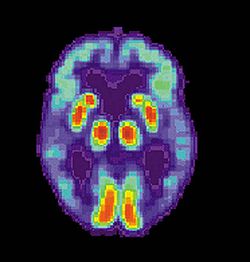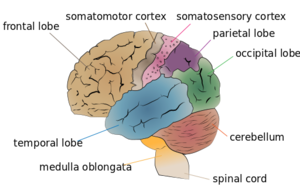Atheism and Alzheimer's disease

Alzheimer's disease is "characterised by loss of neurons and synapses in the cerebral cortex and certain subcortical regions. This loss results in gross atrophy of the affected regions, including degeneration in the temporal lobe and parietal lobe, and parts of the frontal cortex and cingulate gyrus.[1] Some of the primary symptoms of Alzheimer's disease are: memory problems, mood swings, emotional outbursts, brain stem damage which impairs function in the heart, lungs plus causes disruption of various other bodily processes.[2]
The current global atheist population mostly resides in East Asia (particularly China) and in secular Europe/Australia primarily among whites.[3] See: Global atheism
Alzheimer's disease is more common among the elderly and in terms of global atheism and aging populations, global atheism is facing significant challenges in terms of aging populations in East Asia and Europe and atheism is expected to shrink in terms of its market share of the world's population (see: Desecularization).
One of the primary reasons why irreligious regions are facing significant rates of Alzeimer's disease per capita is due to the sub-replacement levels of births of irreligious regions (see: Atheism and fertility rates) which results in disproportionally large elderly populations. Furthermore, obesity/diet are linked to the development of Alzheimer's disease.[4][5] Secular Europe and communist China have significant problems with obesity (see: Secular Europe and obesity and China and obesity). In addition, Australia has a significant problem with obesity (see: Australia, irreligion and obesity). In the United States at the present time, the greater the degree of irreligiosity in a generation, the higher their obesity rate is. According to the Gallup Inc., "Very religious Americans are more likely to practice healthy behaviors than those who are moderately religious or nonreligious."[6] For more information, please see Atheism and obesity.
Contents
- 1 Religious practices and the progression of Alzheimer's disease
- 2 Secular Europe and Alzheimer's disease
- 3 Atheist controlled mainland China and Alzheimer's disease
- 4 Australia and Alzheimer's disease
- 5 See also
- 6 References
Religious practices and the progression of Alzheimer's disease
See also: Atheism and the brain

The American Academy of Neurology reported:
| “ | Spirituality and the practice of religion may help slow the progression of Alzheimer’s disease, according to research that will be presented at the American Academy of Neurology 57th Annual Meeting in Miami Beach, Fla., April 9 – 16, 2005.
The study assessed 68 people aged 49 to 94 who met criteria for probable Alzheimer’s disease. Religiosity and spirituality were measured with the validated Duke University Religion Index and the Overall Self-Ranking subscale from the NIH/Fetzer Brief Multidimensional Measure of Religiousness/Spirituality. These methods collected information on the patients’ practices such as attendance at religious events and private religious activities. “We learned that the patients with higher levels of spirituality or higher levels of religiosity may have a significantly slower progression of cognitive decline,” said study author Yakir Kaufman, MD, who conducted the research as a fellow at of the Baycrest Centre for Geriatric Care in Toronto, Ontario and is now the director of neurology services at The Sarah Herzog Memorial Hospital in Jerusalem, Israel. “Spirituality and religiosity have been linked to better health outcomes,” said Kaufman. “Our research addressed the question whether this link is also relevant in Alzheimer’s disease.” Spirituality and private religious practices accounted for 20 percent of the total variance. Kaufman said that further studies are needed to better understand the connection between religiosity and cognitive decline. “These findings may warrant an interventional study looking at the possible effect of enhancement of spiritual well-being as a means of slowing cognitive decline,” said Kaufman.[7] |
” |
The abstract for the 1990 journal article Spirituality, religion, and Alzheimer's disease published in the Journal of Health Care Chaplaincy indicates:
| “ | The chaplain's ministry to persons with dementia, often of the Alzheimer's type, is vitally relevant to their clinical well-being. No chaplain should even think that because someone is demented, they can no longer be reached spiritually. While few scientific studies exist, clinical experience and anecdotal accounts suggest that selected pastoral interventions can enhance the quality of life of the mildly, moderately, and even severely demented individual.[8] | ” |
Nun study and Alzheimer's disease
The New York Times reported on the famous Nun Study relating to Alzheimer's disease:
| “ | Overall, Dr. Snowdon says, the nuns live significantly longer than other women. Of the 678 in the study, 295 are alive and are all 85 or older. In the Mankato convent alone, there have been seven centenarians, many free of dementia.[9] | ” |
The abstract for the 2003 journal article Healthy aging and dementia: findings from the Nun Study published in the Annals of Internal Medicine states:
| “ | The Nun Study is a longitudinal study of 678 Catholic sisters 75 to 107 years of age who are members of the School Sisters of Notre Dame congregation. Data collected for this study include early and middle-life risk factors from the convent archives, annual cognitive and physical function evaluations during old age, and postmortem neuropathologic evaluations of the participants' brains. The case histories presented include a centenarian who was a model of healthy aging, a 92-year-old with dementia and clinically significant Alzheimer disease neuropathology and vascular lesions, a cognitively and physically intact centenarian with almost no neuropathology, and an 85-year-old with well-preserved cognitive and physical function despite a genetic predisposition to Alzheimer disease and an abundance of Alzheimer disease lesions. These case histories provide examples of how healthy aging and dementia relate to the degree of pathology present in the brain and the level of resistance to the clinical expression of the neuropathology.[10] | ” |
Regular prayer/meditation and larger frontal lobes
See also: Religiosity and larger frontal lobes and Atheism and the brain and Religious individuals and thicker cerebral cortices
According to Scientific American:
| “ | Several studies have revealed that people who practice meditation or have prayed for many years exhibit increased activity and have more brain tissue in their frontal lobes, regions associated with attention and reward, as compared with people who do not meditate or pray.[11] | ” |
The Centre for Neuro Skills say about the frontal lobes and their function:
| “ | The frontal lobes are considered our emotional control center and home to our personality. There is no other part of the brain where lesions can cause such a wide variety of symptoms (Kolb & Wishaw, 1990). The frontal lobes are involved in motor function, problem solving, spontaneity, memory, language, initiation, judgement, impulse control, and social and sexual behavior. The frontal lobes are extremely vulnerable to injury due to their location at the front of the cranium, proximity to the sphenoid wing and their large size. MRI studies have shown that the frontal area is the most common region of injury following mild to moderate traumatic brain injury (Levin et al., 1987).
There are important asymmetrical differences in the frontal lobes. The left frontal lobe is involved in controlling language related movement, whereas the right frontal lobe plays a role in non-verbal abilities. Some researchers emphasize that this rule is not absolute and that with many people, both lobes are involved in nearly all behavior.[12] |
” |
Healthline.com declares about the frontal lobe:
| “ | The frontal lobe is the part of the brain that controls important cognitive skills in humans, such as emotional expression, problem solving, memory, language, judgment, and sexual behavior. It is, in essence, the “control panel” of our personality and our ability to communicate.
It is also responsible for primary motor function, or our ability to consciously move our muscles, and the two key areas related to speech, including Broca’s area. The frontal lobe is larger and more developed in humans than in any other organism.[13] |
” |
The health writer Molly McAdams writes about the function of the frontal lobes:
| “ | Higher-level thinking is supported by the frontal lobes. Activity in these lobes allows us to reason, make judgments, make plans for the near and far future, make choices, take action, solve problems and generally control our living environment. Without fully functioning frontal lobes, you may have intelligence, but you wouldn’t be able to put it to use.[14] | ” |
Reluctance of Western atheists to engage in meditation
The atheist Greta Christina wrote at the website Humananist.com:
| “ | A lot of atheists, humanists, and other nonbelievers are leery or dismissive of meditation and mindfulness. Some see it as an irretrievably religious or spiritual practice, and want no part in it. Others are put off by the faddish, overused, buzzword quality of the practice and the terminology. And I can understand that. For years, I stayed away from trying this stuff out, for exactly those reasons. I was interested in the practice—I had friends who did it, and who seemed to get a lot out of it. But I couldn’t find anyplace to learn that didn’t base their teaching on Buddhism or some other religion. And I’m too ardent an anti-religionist to “take what you need and leave the rest,” the way many nonbelievers do with religion. After all, I literally wrote the book on angry atheism. For me, trying to learn meditation in a Buddhist center would be like trying to learn meditation in a room full of fingernails scraping on blackboards.[16] | ” |
Although many atheists in the Western World are reluctant to meditate, in the East nontheist Buddhists often practice meditation.[17]
Atheism vs. theism, purpose in life and rate of Alzheimer's disease
See also: Atheism and purpose and Atheism and meaninglessness
ABC News reported:
| “ | Patients who maintain a greater sense of purpose in life as they age may have greater protection against Alzheimer's disease, researchers have found.
Those with a purpose had more than a 50 percent reduced risk of the disease, Dr. Patricia A. Boyle of Rush University Medical Center in Chicago and colleagues reported in the March issue of the journal Archives of General Psychiatry.[18] |
” |
Under an atheist worldview, there is no objective meaning or purpose in life.[21] Through Jesus Christ, Christianity offers objective meaning and purpose to life.[22] See also: Atheism and purpose and Atheism and inspiration
As adults, children who attended religious services regularly are 47 percent more likely to have a high sense of mission and purpose.[23]
In December 2003, the University of Warwick reported:
| “ | Dr. Stephen Joseph, from the University of Warwick, said: "Religious people seem to have a greater purpose in life, which is why they are happier. Looking at the research evidence, it seems that those who celebrate the Christian meaning of Christmas are on the whole likely to be happier.[24] | ” |
Effects of Spiritual Group Therapy on Caregiver Strain in Home Caregivers of the Elderly with Alzheimer's Disease
The abstract of the 2017 journal article Effects of Spiritual Group Therapy on Caregiver Strain in Home Caregivers of the Elderly with Alzheimer's Disease published in the Archives of Psychiatric Nursing indicated:
| “ | Care of patients with Alzheimer's disease is one of the most difficult types of care that exposes the caregiver to a high level of care strain. The present research aimed at determining the effect of spiritual care on caregiver strain of the elderly with Alzheimer's disease...
Spiritual care can reduce care strain in home caregivers of the elderly with Alzheimer's disease.[25] |
” |
Secular Europe and Alzheimer's disease
See also: Secular Europe

If left unchecked, roughly 9 million people in the EU are expected to have dementia by 2030 – approaching twice the population of Denmark.[26]
From a global perspective, Europe is more secular/atheistic than the rest of the world although it does have a considerable amount of religious immigrants who have significantly higher birth rates (see: Secular Europe and Atheist population and Global atheism).
According to Politico:
| “ | Alzheimer’s disease and related dementias are putting an enormous socio-economic burden on healthcare systems, families, and caregivers. Populations in Europe are ageing, and with this will grow the prevalence of Alzheimer’s disease. If left unchecked, roughly 9 million people in the EU are expected to have dementia by 2030 – approaching twice the population of Denmark.[27] | ” |
According to the abstract of the 2017 journal article Prevalence and incidence of Alzheimer's disease in Europe: A meta-analysis published in the journal Neurologia:
| “ | The prevalence of Alzheimer's disease in Europe was estimated at 5.05% (95% CI, 4.73-5.39). The prevalence in men was 3.31% (95% CI, 2.85-3.80) and in women, 7.13% (95% CI, 6.56-7.72), and increased with age. The incidence of Alzheimer's disease in Europe was 11.08 per 1000 person-years (95% CI, 10.30-11.89). Broken down by sex, it was 7.02 per 1000 person-years (95% CI, 6.06-8.05) in men and 13.25 per 1000 person-years (95% CI, 12.05-14.51) in women; again these rates increased with age.[28] | ” |
Atheist controlled mainland China and Alzheimer's disease
See also: China and atheism
China has the world's largest atheist population.[30][31] China practices state atheism (see: China and atheism).
East Asia contains about 25 percent of the world’s population. China’s population represents 20 percent of the people on earth.[32]
Razib Khan points out in Discover Magazine, "most secular nations in the world are those of East Asia, in particular what are often termed “Confucian societies.” It is likely therefore that the majority of the world’s atheists are actually East Asian."[33] See: Asian atheism and Global atheism
China and Alzheimer's disease
In 2017, the South China Morning Post indicated:
| “ | No health care problem looms larger in China than Alzheimer’s disease. It is the fastest-growing major disease on the mainland, with at least 9.5 million sufferers and perhaps as many undiagnosed cases. Almost a million Chinese are diagnosed every year with Alzheimer’s, with the number of new cases expected to rise sharply by around 2030.
Of the major diseases in China, Alzheimer’s also has the greatest mismatch between the number of patients and amount of specialised care available. [34] |
” |
Australia and Alzheimer's disease
See also: Irreligion in Australia
After WWII, Australia has become a very secular country.[37]
According to the Sydney Morning Herald:
| “ | Australia is one of the least devout countries in the Western world, although two-thirds of its population identifies itself as Christian, an international survey comparing religious expression in 21 countries has found.
Religion does not play a central part in the lives of many Australians: 48 per cent of Australians surveyed said they did not partake in personal prayer and 52 per cent said they rarely attended a place of worship for religious reasons.[38] |
” |
Over 342,000 Australians are living with dementia — a number which is expected to increase to 400,000 before 2030.[39]
According to the website My Virtual Medical Centre:
| “ | Dementia affects about 10% of those aged over 65 years with 20% of those over 80 years suffering from severe dementia. Women may be at slightly higher risk of developing Alzheimer’s disease than men. An Access Economics report commissioned by Alzheimer’s Australia and published in March 2005 suggests that the number of people with dementia in Australia will be 25% higher by 2050 than was predicted in 2003.
The report estimates that:
During 2050, it is projected that there will be over 175,000 new cases diagnosed.[40] |
” |
See also
- Atheism and the brain
- Atheism and autism
- Atheism and intelligence
- Atheism and health
- Atheism and life expectancy
- Atheism and obesity
- Atheism and mental illness
- Atheism and cancer
- Atheism and diabetes
References
- ↑ Neurodegeneration in Alzheimer's and Parkinson's
- ↑ Alzheimer's disease
- ↑ A surprising map of where the world’s atheists live, By Max Fisher and Caitlin Dewey, Washington Post, May 23, 2013
- ↑ Obesity + aging linked to Alzheimer's markers in the brain, Science Daily, June 28, 2018
- ↑ Obesity as a risk factor for Alzheimer's disease: weighing the evidence. by Alford S, Patel D, Perakakis N, Mantzoros CS., Obesity Reviews. 2018 Feb;19(2):269-280. doi: 10.1111/obr.12629. Epub 2017 Oct 10.
- ↑ Very Religious Americans Lead Healthier Lives, Gallup Poll, 2010
- ↑ SPIRITUALITY, RELIGIOUS PRACTICE MAY SLOW PROGRESSION OF ALZHEIMER’S DISEASE, American Academy of Neurology
- ↑ Spirituality, religion, and Alzheimer's disease. by SG1, Whitehouse PJ., Journal of Health Care Chaplaincy, 1999;8(1-2):45-57.
- ↑ Nuns Offer Clues to Alzheimer's and Aging, Nuns Offer Clues to Alzheimer's and Aging], By PAM BELLUCKMAY 7, 2001
- ↑ Healthy aging and dementia: findings from the Nun Study', Snowdon DA, Annals of Internal Medicine 2003 Sep 2;139(5 Pt 2):450-4.
- ↑ Ask the Brains, Scientific American, Dec 23, 2011
- ↑ Frontal lobes, The Centre for Neuro Skills
- ↑ Frontal lobe, Healthline.com
- ↑ [What Are the Functions of Frontal Lobe of Brain?] by Molly McAdams
- ↑ Mind is Matter, Greta Christina, The Humanist.com
- ↑ Mind is Matter, Greta Christina, The Humanist.com
- ↑ Christians Talk about Buddhist Meditation, Buddhists Talk About Christian Prayer, edited by Rita M. Gross, Terry C. Muck, page 89
- ↑ Living a Purposeful Life Can Stave Off Alzheimer's by KRISTINA FIORE, ABC News, March 2, 2010
- ↑ Religious affiliation and suicide rate
- ↑ Adherents.com - suicide rates
- ↑
- Can Life Have Meaning Without God? by James Anderson
- Atheism’s Universe is Meaningless and Valueless by J.W. Wartick, January 3, 2011
- Can atheists have meaning and purpose in life?
- Why atheism by Katie Galloway, 2014
- Heat Death and Atheist Inconsistency (or, Isn’t It Ironic?)
- Atheism and Death: Why the atheist must face death with despair By Dustin Shramek
- Apathy, Atheism, and the Absurdity of Life Without God by Aaron Brake
- The Meaningless Life Of Atheism by Daniel Prayson, 2010
- ↑
- ↑ How to Help Prevent Your Child from Becoming an Atheist by Joe Carter
- ↑ http://www.scienceblog.com/community/older/2003/A/20037338.html
- ↑ [Effects of Spiritual Group Therapy on Caregiver Strain in Home Caregivers of the Elderly with Alzheimer's Disease] by Mahdavi B1, Fallahi-Khoshknab M2, Mohammadi F1, Hosseini MA1, Haghi M1., Archives of Psychiatric Nursing, 2017 Jun;31(3):269-273. doi: 10.1016/j.apnu.2016.12.003. Epub 2016 Dec 7.
- ↑ Addressing Alzheimer’s disease in Europe: What still needs to be done?, Politico, 2016
- ↑ Addressing Alzheimer’s disease in Europe: What still needs to be done?, Politico, 2016
- ↑ Prevalence and incidence of Alzheimer's disease in Europe: A meta-analysis by Niu H1, Álvarez-Álvarez I2, Guillén-Grima F3, Aguinaga-Ontoso I2., Neurologia. 2017 Oct;32(8):523-532. doi: 10.1016/j.nrl.2016.02.016. Epub 2016 Apr 26.
- ↑
- Top 50 Countries With Highest Proportion of Atheists / Agnostics (Zuckerman, 2005)
- A surprising map of where the world’s atheists live, Washington Post By Max Fisher and Caitlin Dewey May 23, 2013
- ↑ Top 50 Countries With Highest Proportion of Atheists / Agnostics (Zuckerman, 2005)
- ↑ A surprising map of where the world’s atheists live, Washington Post By Max Fisher and Caitlin Dewey May 23, 2013
- ↑ The Growth of Christianity in East Asia
- ↑ Most atheists are not white & other non-fairy tales, Discover magazine
- ↑ China’s millions of Alzheimer’s patients cannot wait any longer for specialised care, South China Morning Post, 2017
- ↑ WORLD RANKING OF COUNTRIES BY THEIR AVERAGE
- ↑ Are we becoming more STUPID? IQ scores are decreasing - and some experts argue it's because humans have reached their intellectual peak, Daily Mail, 2014
- ↑ Stephanie Painter, Vivienne Ryan and Bethany Hiatt, (15 June 2010). "Australians losing the faith". Newspaper. West Australian Newspapers Ltd. Retrieved 15 June 2010
- ↑ God's OK, it's just the religion bit we don't like
- ↑ [ https://www.alz.org/au/dementia-alzheimers-australia.asp Australians and dementia]
- ↑ Alzheimer's disease, My Virtual Medical Centre



